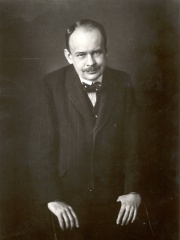
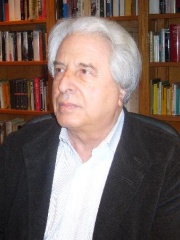

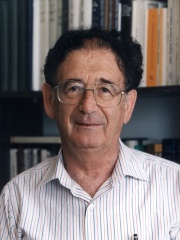
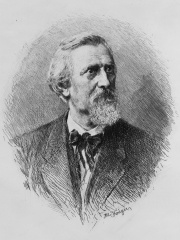
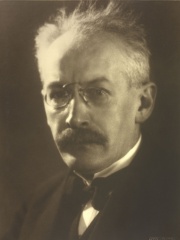
The Most Famous
HISTORIANS from Czechia
This page contains a list of the greatest Czech Historians. The pantheon dataset contains 561 Historians, 7 of which were born in Czechia. This makes Czechia the birth place of the 17th most number of Historians behind Spain, and Iran.
Top 7
The following people are considered by Pantheon to be the most legendary Czech Historians of all time. This list of famous Czech Historians is sorted by HPI (Historical Popularity Index), a metric that aggregates information on a biography's online popularity.

1. Max Dvořák (1874 - 1921)
With an HPI of 62.34, Max Dvořák is the most famous Czech Historian. His biography has been translated into 20 different languages on wikipedia.
Max Dvořák (24 June 1874 – 8 February 1921) was a Czech-born Austrian art historian. He was a professor of art history at the University of Vienna and a famous member of the Vienna School of Art History, employing a Geistesgeschichte methodology.

2. Saul Friedländer (b. 1932)
With an HPI of 60.89, Saul Friedländer is the 2nd most famous Czech Historian. His biography has been translated into 20 different languages.
Saul Friedländer (Hebrew: שאול פרידלנדר; born October 11, 1932) is a Czech-born Jewish historian and a professor emeritus of history at UCLA.

3. Sigfried Giedion (1888 - 1968)
With an HPI of 60.26, Sigfried Giedion is the 3rd most famous Czech Historian. His biography has been translated into 18 different languages.
Sigfried Giedion (also spelled Siegfried Giedion; 14 April 1888 in Prague – 10 April 1968 in Zürich) was a Bohemian-born Swiss historian and critic of architecture. His ideas and books, Space, Time and Architecture, and Mechanization Takes Command, had an important conceptual influence on the members of the Independent Group at the Institute of Contemporary Arts in the 1950s. Giedion was a pupil of Heinrich Wölfflin. He was the first secretary-general of the Congrès International d'Architecture Moderne (CIAM), and taught at the Massachusetts Institute of Technology, Harvard University, and the ETH-Zurich. In Space, Time & Architecture (1941), Giedion wrote an influential standard history of modern architecture, while Mechanization Takes Command established a new kind of historiography.

4. Yehuda Bauer (1926 - 2024)
With an HPI of 58.95, Yehuda Bauer is the 4th most famous Czech Historian. His biography has been translated into 22 different languages.
Yehuda Bauer (Hebrew: יהודה באואר; 6 April 1926 – 18 October 2024) was a Czech-born Israeli historian and scholar of the Holocaust. He was a professor of Holocaust studies at the Avraham Harman Institute of Contemporary Jewry at the Hebrew University of Jerusalem.

5. Miroslav Hroch (b. 1932)
With an HPI of 57.52, Miroslav Hroch is the 5th most famous Czech Historian. His biography has been translated into 17 different languages.
Prof. Miroslav Hroch (born 14 June 1932 in Prague) is a Czech historian and political theorist and a professor at the Charles University in Prague. Hroch earned his PhD at the Charles University in 1962. On May 30, 1997 Hroch received an honorary doctorate from the Faculty of Humanities at Uppsala University, Sweden Miroslav Hroch has earned international academic renown for his works about formation and evolution of the national movements of Central and Eastern European nations. He has significantly contributed to the establishment of comparative history as a research field in East-Central Europe. Hroch defined three chronological stages in the creation of a nation: Phase A: Activists strive to lay the foundation for a national identity. They research the cultural, linguistic, social and sometimes historical attributes of a non- dominant group in order to raise awareness of the common traits—but they do this "without pressing specifically national demands to remedy deficits." Phase B: "A new range of activists emerged, who sought to win over as many of their ethnic group as possible to the project of creating a future nation." Phase C: The majority of the population forms a mass movement. "In this phase, a full social movement comes into being and movement branches into conservative- clerical, liberal and democratic wings, each with its own program." Hroch's definition of nation: "Now the 'nation is not, of course, an eternal category, but was the product of a long and complicated process of historical development in Europe. For our purposes, let us define it at the outset as a large social group integrated not by one but by a combination of several kinds of objective relationships (economic, political, linguistic, cultural, religious, geographical, historical), and their subjective reflection in collective consciousness. Many of these ties could be mutually substituable - some playing a particularly important role in one nation-building process, and no more than a subsidiary part in others. But among them, three stand out as irreplaceable: a 'memory' of some common past, treated as a 'destiny' of the group - or at least of its core constituents; a density of linguistic or cultural ties enabling a higher degree of social communication within the group than beyond it; a conception of the equality of all members of the group organized as a civil society."

6. Anton Heinrich Springer (1825 - 1891)
With an HPI of 55.79, Anton Heinrich Springer is the 6th most famous Czech Historian. His biography has been translated into 15 different languages.
Anton Heinrich Springer (13 July 1825 – 31 May 1891) was a German art historian and writer.

7. Zdeněk Nejedlý (1878 - 1962)
With an HPI of 55.57, Zdeněk Nejedlý is the 7th most famous Czech Historian. His biography has been translated into 17 different languages.
Zdeněk Nejedlý (10 February 1878 – 9 March 1962) was a Czech musicologist, historian, music critic, author, and politician whose ideas dominated the cultural life of what is now the Czech Republic for most of the twentieth century. Although he started out merely reviewing operas in Prague newspapers in 1901, by the interwar period his status had risen, guided primarily by socialist and later Communist political views. This combination of left wing politics and cultural leadership made him a central figure in the early years of the Czechoslovak Socialist Republic after 1948, where he became the first Minister of Culture and Education. In this position he was responsible for creating a statewide education curriculum, and was associated with the early 1950s expulsion of university professors.
People
Pantheon has 7 people classified as Czech historians born between 1825 and 1932. Of these 7, 2 (28.57%) of them are still alive today. The most famous living Czech historians include Saul Friedländer, and Miroslav Hroch. The most famous deceased Czech historians include Max Dvořák, Sigfried Giedion, and Yehuda Bauer.
Living Czech Historians
Go to all RankingsDeceased Czech Historians
Go to all RankingsMax Dvořák
1874 - 1921
HPI: 62.34
Sigfried Giedion
1888 - 1968
HPI: 60.26
Yehuda Bauer
1926 - 2024
HPI: 58.95
Anton Heinrich Springer
1825 - 1891
HPI: 55.79
Zdeněk Nejedlý
1878 - 1962
HPI: 55.57
Overlapping Lives
Which Historians were alive at the same time? This visualization shows the lifespans of the 5 most globally memorable Historians since 1700.

